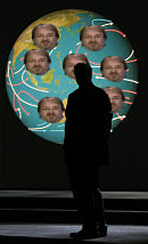They Even Have the Nerve to Call it "Football"
 Saturday, June 10, 2006 at 09:32AM
Saturday, June 10, 2006 at 09:32AM  Quote: “The game — the simple game, the beautiful game — has become the global game.” Michael Elliott and Simon Robinson in Time.
Quote: “The game — the simple game, the beautiful game — has become the global game.” Michael Elliott and Simon Robinson in Time.
Figure of Speech: conduplicatio (con-du-plih-CAT-io), the repeater.
The global game is soccer, of course, whose World Cup is playing in a dozen German cities. Writers Elliott and Robinson express their love for the sport — sorry, game — with a conduplicatio (“doubling”), a figure that repeats a word for emotional emphasis, pushed along by adjectives .
In school we’re taught not to repeat ourselves. A diligent teacher might edit the sentence to read, “Soccer has become global.” But the purpose of the sentence is not just to make a global point; it’s to make you love soccer. The difference, in other words, is purely rhetorical. The art of rhetoric — the complex art, the beautiful art — is a persuasive art.
Snappy Answer: “That explains why Americans don’t watch soccer.”






